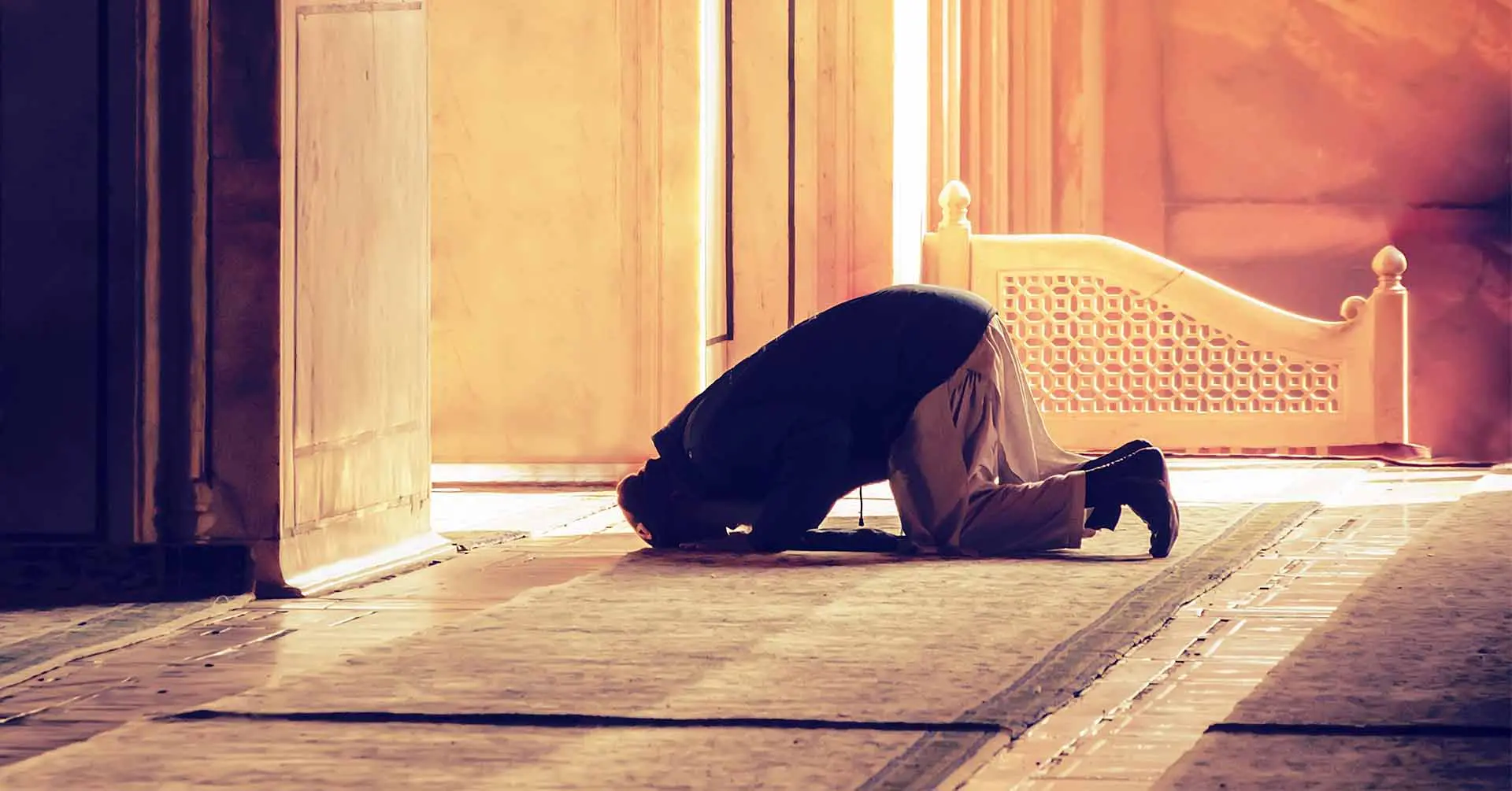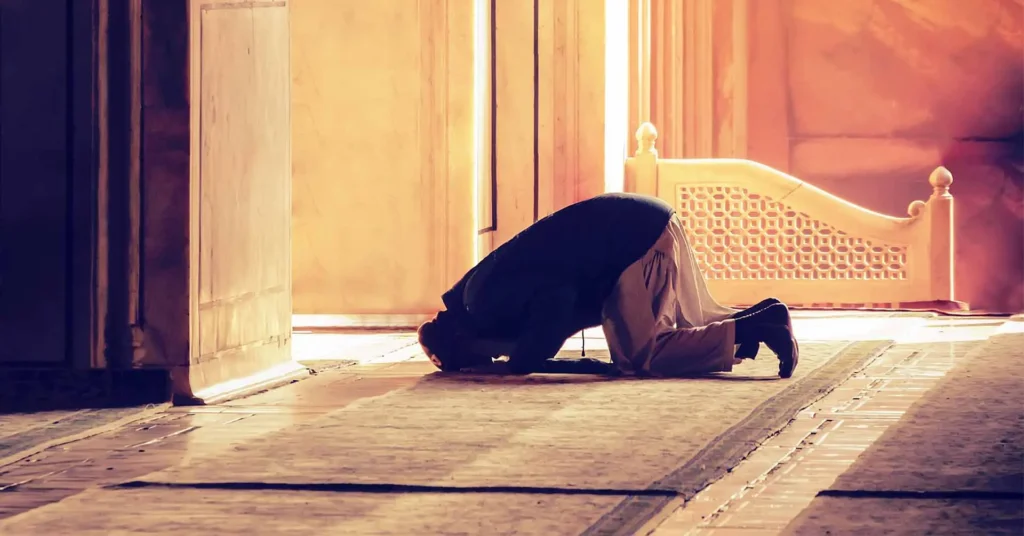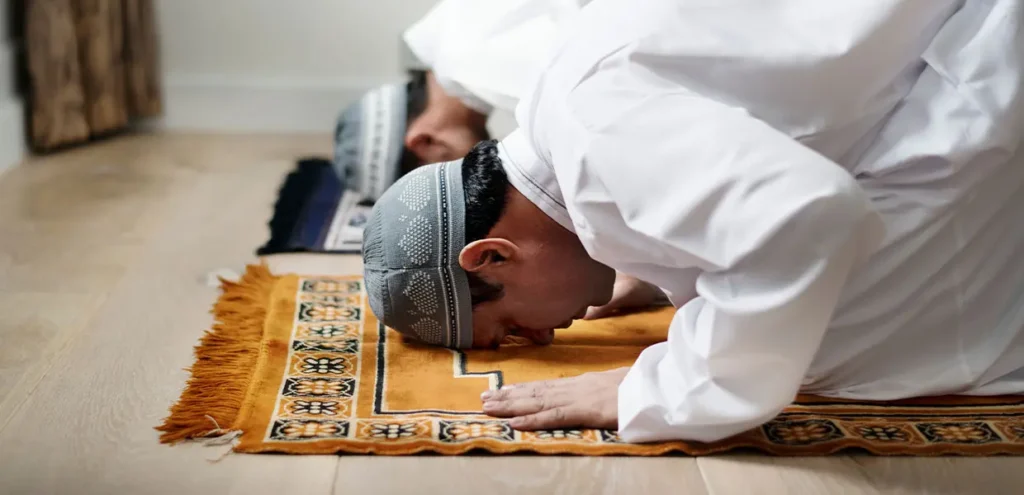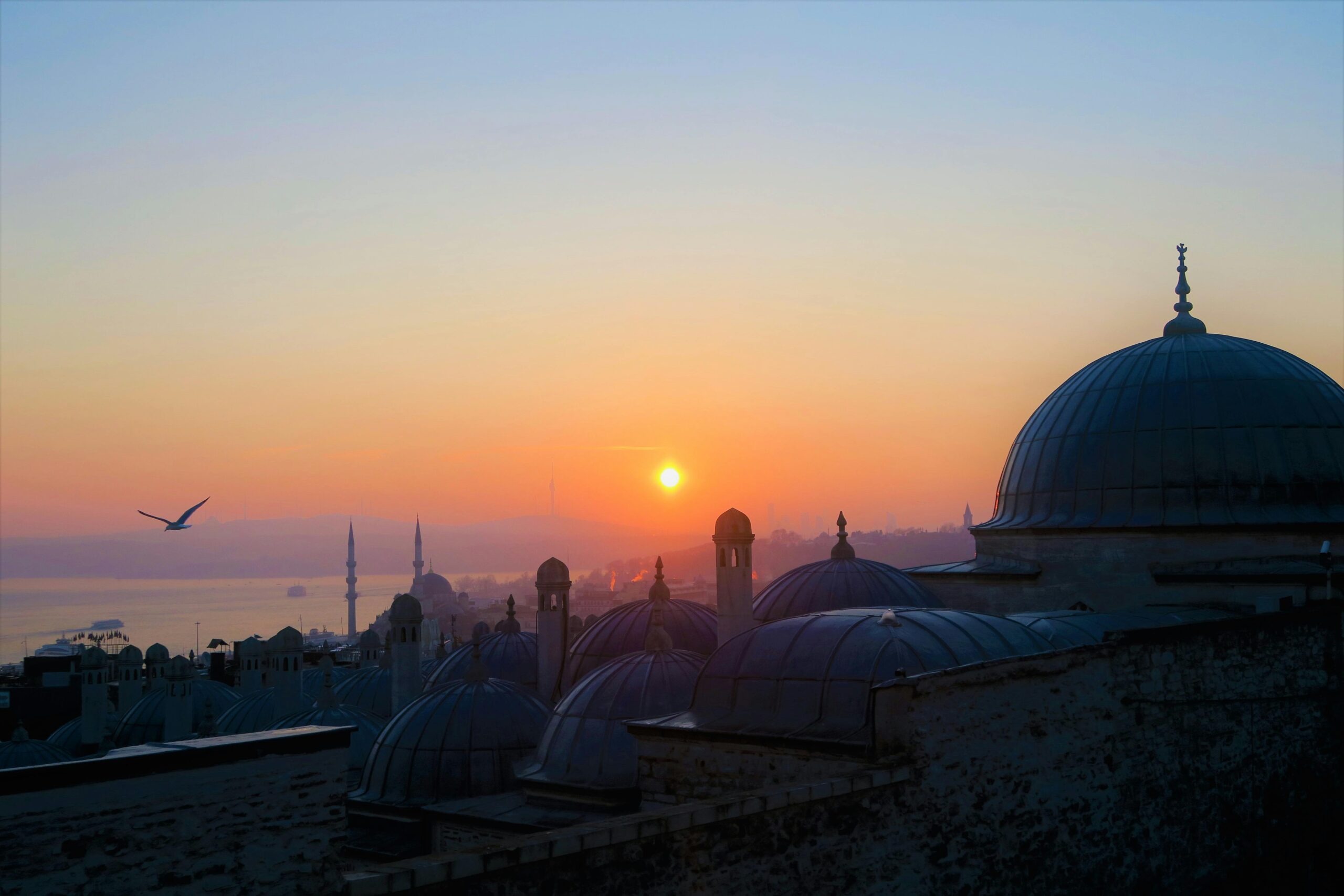
03.27.25
What is Salah (Salat)?
Salah, also known as Salat or Prayer, is one of the five pillars of Islam and is a fundamental act of worship for Muslims. It involves the obligatory act of praying 5 times a day at set times, and is a direct means of communication with Allah.
Muslims perform Salah as an essential part of their daily lives to seek guidance, forgiveness, and blessings from Allah and to fulfil their rights to Him. It involves performing specific physical movements and recitations whilst facing the Qiblah (direction of the Ka’bah in Makkah). The key in Salah is to have khushoo, which means to have focus and concentrate on the presence of Allah.
“Your ally is none but Allah and [therefore] His Messenger and those who have believed – those who establish prayer and give zakah, and they bow [in worship].”
Quran | Surah Al-Ma’idah | 5:55
What are the 5 daily prayers of Islam?
Muslims must perform 5 daily prayers. These are:
- Fajr – this takes place at pre-dawn.
- Dhuhr – this takes place just after the sun reaches its zenith.
- Asr – this takes place between noon and sunset.
- Maghrib – this takes place just after sunset.
- Isha – this takes place during the night/at night-time.
Why is Salah important?
Salah is an integral part of the lifestyle of a Muslim. Through prayer, Muslims spend each day pondering on the verses of the Qur’an, the Shahadah (the declaration of faith), and Allah’s attributes.
Muslims across the world unite in prayer at five specified times each day in the direction (Qibla) of the Ka’bah in Makkah (Mecca), as a means of connecting to Allah and their purpose in life – to remember and worship Him.
“Maintain with care the (obligatory) prayers and (in particular) the middle prayer and stand before Allah, devoutly obedient.”
Qur’an | Surah al-Baqarah | 2:238
How many Raka’at do the 5 Salawat have?
The 5 Salawat consist of various Fardh (obligatory) and Sunnah/Nafl (recommended/supererogatory) aspects. These are as follows:
| Salah | Sunnah | Fardh | Sunnah | Nafl | Witr | Nafl |
|---|---|---|---|---|---|---|
| Fajr | 2 Raka’at | 2 Raka’at | ||||
| Dhuhr | 4 Raka’at | 4 Raka’at | 2 Raka’at | 2 Raka’at | ||
| Asr | 4 Raka’at | 4 Raka’at | ||||
| Maghrib | 3 Raka’at | 2 Raka’at | ||||
| Isha | 4 Raka’at | 4 Raka’at | 2 Raka’at | 2 Raka’at | Any odd number of raka’at (most commonly 3) | 2 Raka’at |
What are Fardh prayers?
Fardh (Fard) prayers and Raka’at (units of prayer) are the prayers which are compulsory for us to perform.
The number of Fardh Raka’at differ for each prayer. For our 5 daily prayers, Fajr has 2, Dhuhr has 4, Asr has 4, Maghrib has 3, and Isha has 4.
What are the Sunnah and Nafl prayers?
Sunnah prayers are extra voluntary prayers that Prophet Muhammad (ﷺ) would pray in addition to Fardh prayers. Although these are optional, it is highly recommended to follow the Sunnahs of the Prophet (ﷺ) to maximise our rewards.
The confirmed (or “Rawatib”) Sunnah prayers are those associated with the five obligatory prayers (Fard/Fardh). They include the 2 Raka’at before Fajr, 4 Raka’at before Dhuhr and 2 after, 2 Raka’at after Maghrib, and 2 Raka’at after Isha.
“Allah will build a house in Heaven for whoever is diligent in observing 12 Sunnah Raka’at (as follows): 4 Rak’at before and 2 after the Dhuhr (Midday) Prayer, 2 after the Maghrib (Sunset Prayer), 2 after the ‘Isha (Evening) Prayer and 2 before the Fajr (Dawn) Prayer.”
At-Tirmidhi, Al-Jami’.
The ‘Asr (Late-Afternoon) Prayer has no routine Sunnah (basic recommended voluntary prayer). However, it is mustahab (preferable and recommended) that one prays 4 Raka’at before the ‘Asr Prayer.
“May Allah have mercy on one who prays 4 rak’at before the ‘Asr Prayer.”
At-Tirmidhi, Al Albani, Al-Jami’.

Nafl Salah are voluntary prayers that a Muslim may offer at any time as a form of extra Ibadah (worship). Optional prayers include Salat al-Istikhara (the prayer of seeking guidance), Salat at-Tahajjud (prayed late at night) or Salat at-Tawbah (prayer for repentance).
What is Witr Prayer?
Witr prayer is a voluntary night prayer in Islam, usually offered after the Isha prayer, the last of the 5 daily obligatory prayers.
The word “witr” translates to “odd” or “single” in Arabic, referring to the odd number of rak’ahs (units) performed in this prayer. It holds special significance in the Islamic faith and is highly recommended.
The Witr prayer can be offered as 1, 3, 5, 7, or any odd number of Raka’ah – with 1 Rak’at being the minimum according to the majority of scholars and three Raka’at being the minimum in the Hanafi madhab. The most common practice is to perform 3 Raka’at in the Witr prayer. The Witr Prayer is also a Nafl Prayer.
Jumuah Prayer
There is also Salatul-Jumu‘ah or Friday Prayer. This is a congregation prayer offered in place of Dhuhr Prayer every week on Friday. It also has only 2 Raka’at rather than 4 raka’a. However, there is a khutbah (sermon) before Jumu’ah prayer one must listen to for their prayer to count as being valid.
“O you who believe (Muslims)! When the call is proclaimed for the Salah (prayer) on Friday (Jumu‘ah prayer), come to the remembrance of Allah [Jumu‘ah religious talk (Khutbah) and Salah (prayer)] and leave off business (and every other thing).”
Quran | Al-Jumu’ah | 62:9
The Prophet (ﷺ) also persisted on attending the Friday sermon. Some of the Sahabah (Companions) also report that the khutbah is an essential condition for the Friday prayer being valid.
Ibn Qudamah (RA) said: “To sum up, the khutbah is a condition of Jumu`ah, and it is not valid without it, as was stated by ‘Ata, al-Nakha’i, Qatadah, al-Thawri, al-Shafi’i, Ishaq, Abu Thawr and ashab al-rai. And we do not know of anyone who disagreed with that except al-Hasan.” (Al-Mughni)

The Friday prayer is compulsory for every adult male Muslim. Those who are sick, blind or disabled, those on a journey, and women, are exempt from the obligation of attending the Prayer at the mosque. But they may join the congregation if able, and receive reward for it.
There are also Sunnah one can offer after Jumu’ah prayer. As reported by Ibn al-Qayyim, when the Prophet (ﷺ) finished praying Jumu’ah, he would enter his house and pray two Rak’ahs of Sunnah, and he commanded those who had prayed it to pray four raka’at afterwards. (Al-Zad)
How to pray Salah?
Salah is a ritual prayer that requires certain etiquettes in order to perform it correctly. However, there are some slight differences in what etiquettes are required depending on the Madhab (school of thought) you follow within the Fiqh of Islam (Islamic jurisprudence). All four schools of thought are agreed upon and the prayer following any of these is valid.
How to pray Eid Salah?
Eid prayer is prayed in congregation with other Muslims on the mornings of the two Eid celebrations, Eid al-Adha and Eid al-Fitr. You can follow our step-by-step guide to praying Eid Salah here.
When is Salah for my area?
Salah times are appointed to times of the day that depend on the position of the sun. Since parts of the world experience daylight and night differently, it is important to follow the prayer times when you are situated. An authority will usually gather and publish the prayer time in your area for the public’s ease. Please check your local mosque or musallah for prayer times.





